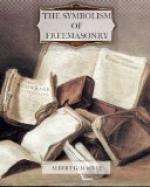BRYANT. Jacob Bryant, frequently quoted in this work, was a distinguished English antiquary, born in the year 1715, and deceased in 1804. His most celebrated work is “A New System of Ancient Mythology,” which appeared in 1773-76. Although objectionable on account of its too conjectural character, it contains a fund of details on the subject of symbolism, and may be consulted with advantage by the masonic student.
BUILDER. The chief architect of the temple of Solomon is often called “the Builder.” But the word is also applied generally to the craft; for every Speculative Mason is as much a builder as was his operative predecessor. An American writer (F.S. Wood, of Arkansas) thus alludes to this symbolic idea. “Masons are called moral builders. In their rituals, they declare that a more noble and glorious purpose than squaring stones and hewing timbers is theirs, fitting immortal nature for that spiritual building not made with hands, eternal in the heavens.” And he adds, “The builder builds for a century; masons for eternity.” In this sense, “the builder” is the noblest title that can be bestowed upon a mason.
BUNYAN, JOHN. Familiar to every one as the author of the “Pilgrim’s Progress.” He lived in the seventeenth century, and was the most celebrated allegorical writer of England. His work entitled “Solomon’s Temple Spiritualized” will supply the student of masonic symbolism with many valuable suggestions.
C
CABALA. The mystical philosophy of the Jews. The word which is derived from a Hebrew root, signifying to receive, has sometimes been used in an enlarged sense, as comprehending all the explanations, maxims, and ceremonies which have been traditionally handed down to the Jews; but in that more limited acceptation, in which it is intimately connected with the symbolic science of Freemasonry, the cabala may be defined to be a system of philosophy which embraces certain mystical interpretations of Scripture, and metaphysical speculations concerning the Deity, man, and spiritual beings. In these interpretations and speculations, according to the Jewish doctors, were enveloped the most profound truths of religion, which, to be comprehended by finite beings, are obliged to be revealed through the medium of symbols and allegories. Buxtorf (Lex. Talm.) defines the Cabala to be a secret science, which treats in a mystical and enigmatical manner of things divine, angelical, theological, celestial, and metaphysical, the subjects being enveloped in striking symbols and secret modes of teaching.
CABALIST. A Jewish philosopher. One who understands and teaches the doctrines of the Cabala, or the Jewish philosophy.




